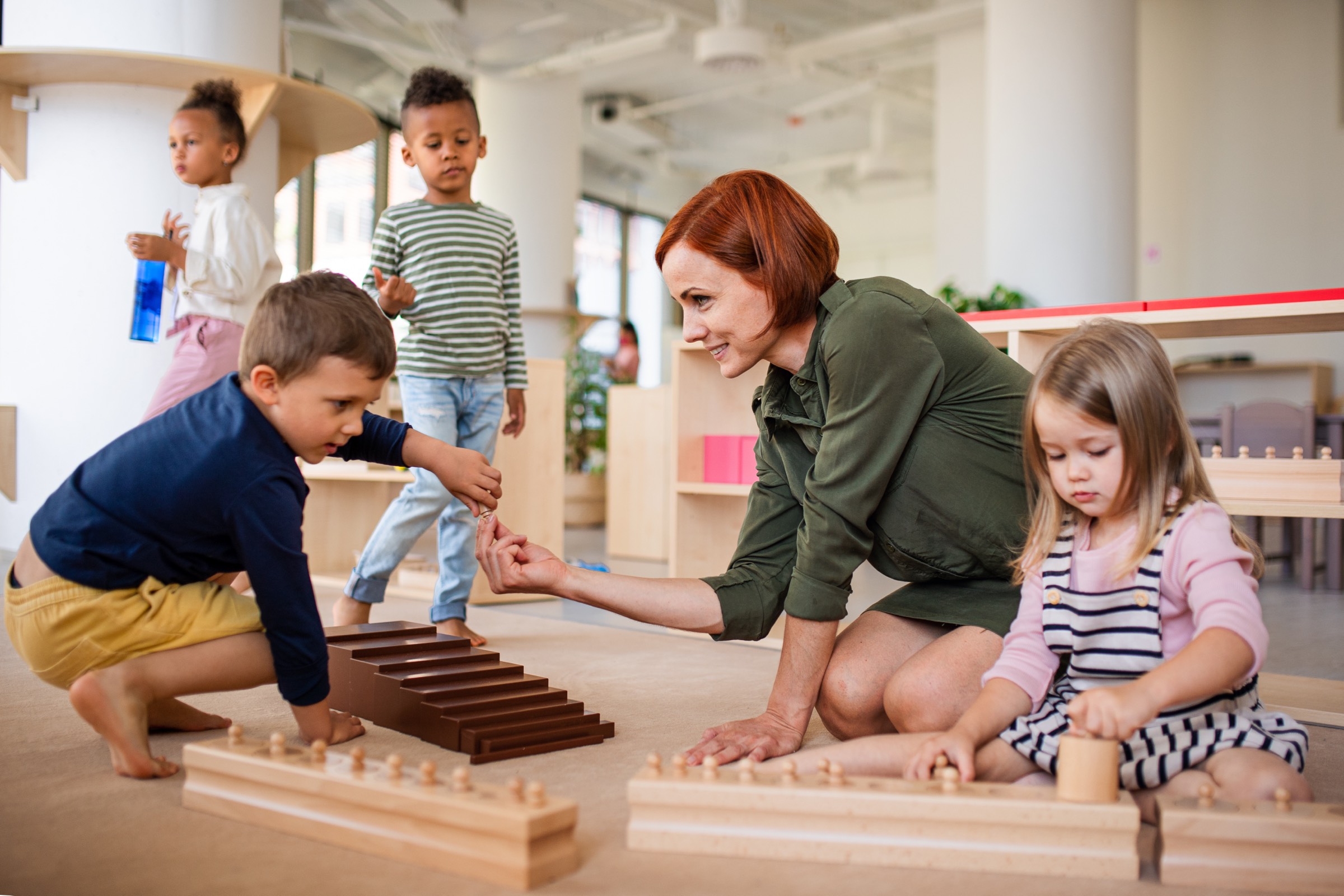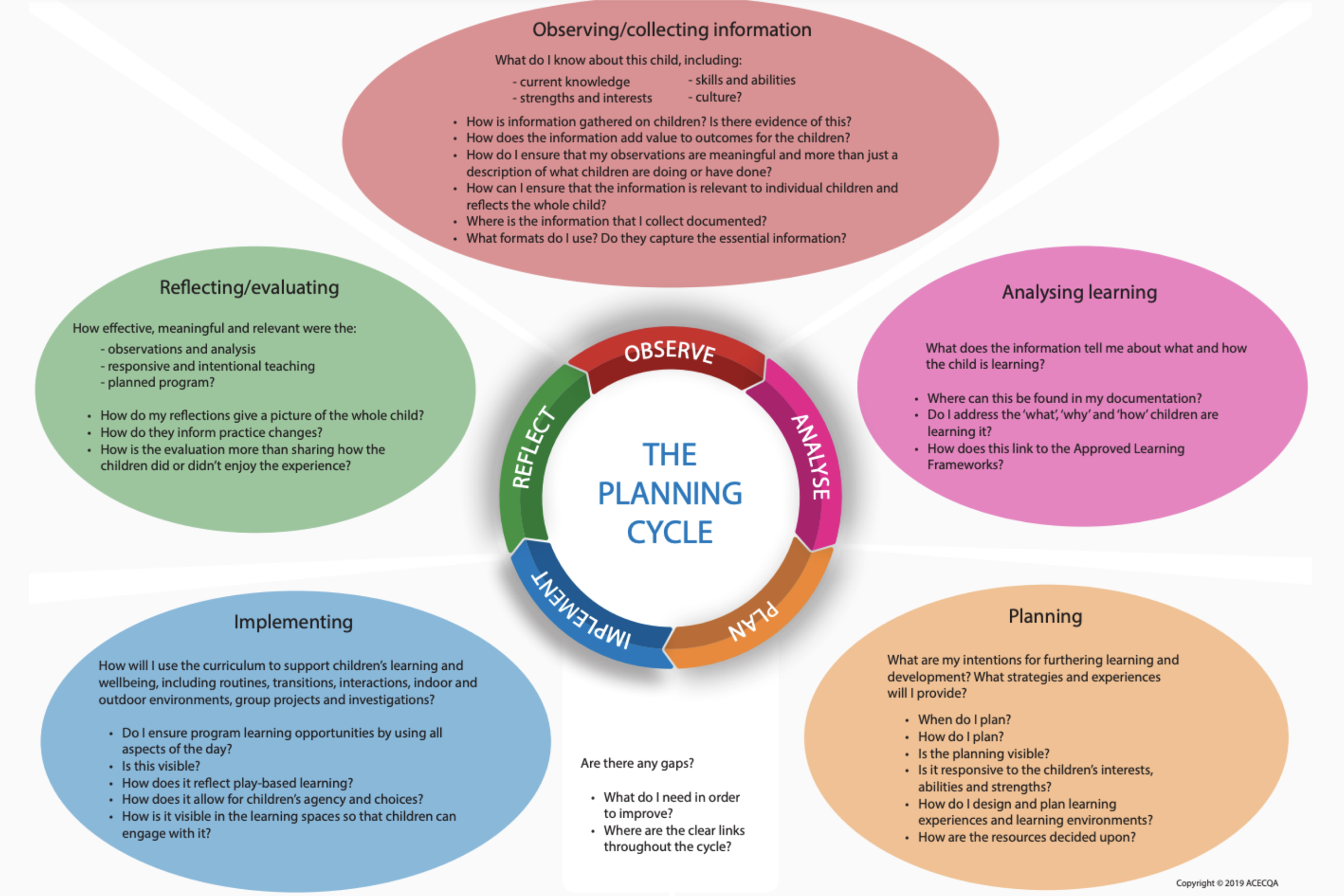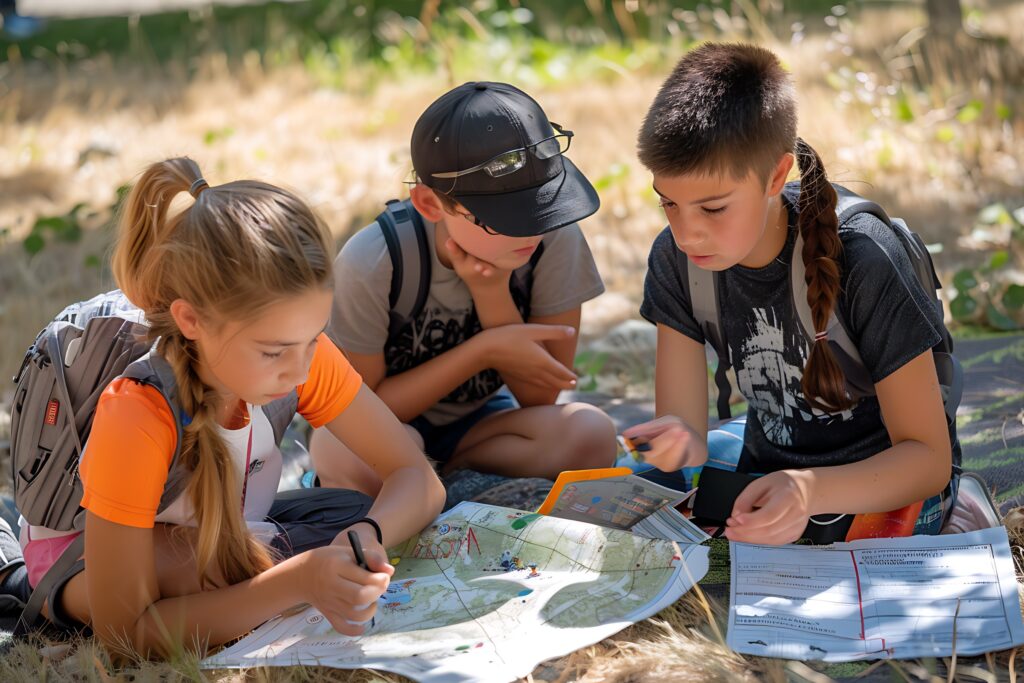The planning cycle and the Montessori method


The Early Childhood approach to learning decisions and documentation is based around the Planning Cycle and has followed this approach for many decades. Over time the segments of the cycle have been rebadged with ‘interpret’ changing to ‘analyse’ and ‘evaluate’ changing to ‘reflect’, however the essence of the Planning Cycle remains consistent. The beauty of the Planning Cycle is that it commences with the word “Observe” which is the foundation and basis of the Montessori method – right from its inception to the current day.

The planning cycle is something that might be pursued in a diligent and deliberate manner when an educator withdraws from children and considers the documentation to create. Educators, however, utilise the planning cycle a myriad of times during their entire working day, albeit possibly in a less conscious manner.
Here is an example of one minute that might have occurred in an educator’s mind:
- Edward has a runny nose. (Observation)
- I had better get that cleaned with him for his comfort and for the hygiene of the room. It is an opportunity to develop independence in self care – part of the practical life curriculum. (Analysing)
- I will take him to the Practical Life section of the room, and particularly to the mirror with the tissues and the bin. I will demonstrate nose wiping with him. (Planning)
- “Edward, let us go to the mirror. (guides to mirror) “Can you see your runny nose? We take a tissue and fold it like this. Then we place it across our hand, and draw our hand together to collect all the snot in the tissue. Now it is your turn. (Scaffolds Edward to blow his nose). That’s it – now see in the mirror it is all clean! (Smiles with Edward). Now we place the tissue in the bin. That’s right, and we will go to wash our hands.” (Implementing)
- He seemed to catch on quickly, however I will keep an eye on his nose to see if the lesson needs repeating. (Reflection)
Even though this is not a deeply reflective process such as someone might undertake for supporting an interest in a child or the group, addressing a significant behavioural challenge or seeking improvements for an area of the environment, it does, never-the-less, still follow the programming cycle. In a 3 hour work cycle, an educator could potentially have 180 examples of following the programming cycle! Obviously the documentation of every single minute is not feasible in any stretch of the imagination!!! However, when reviewing the class in a programming time, the educator may add ‘Blowing Nose’ for Edward in the Summary (MES).
In the same way, a Montessori educator may notice an opportunity to demonstrate, redirect or explore options for activity with children many, many times across a work cycle.
Let’s look at the planning cycle for a typical Casa experience in the mind of an educator:
- Maria has repeated the Pink Tower three times this morning. She has become fluent and accurate – I will mark her as ‘mastered’ in the YCD app. (Observation)
- Maria’s capability with the Pink Tower indicates that she is likely to be ready to be invited to use the Brown Stair. (Analysing)
- I can add Brown Stair ‘readiness indicator’ at the bottom of the Pink Tower record or utilise the Summary (MES) to add a ‘readiness indicator’. (Planning)
- Maria is hovering in Sensorial today, so here is an opportunity to invite her to the Brown Stair. “Maria, may I show you the Brown Stair? (agreement indicated). Let’s roll out a mat in a space. Now let’s go to the shelf and bring over each stair one at a time. We hold them like this. (demonstrates) Thank you for bringing them also. (The educator continues with a demonstration of Brown Stair). (Implementing)
- I will write a comment that the parents will see on their app: “Maria quickly grasped the concept of the Brown Stair. She built the stair twice with fluency, and then commenced exploring comparisons of size between each stair”. I believe that Maria is ready for introduction to the red rods and might respond to a prompt to explore the Pink Tower material and the Brown Stair material together as an extension. I will plan that as a Planned experience. I note that the mats are not being well rolled for storage and I will talk to the team about repeating the mat rolling demonstrations and look for a stronger casket for them to be kept in. (Reflection)
As educators struggle to determine what, where, when and how to document, the YCD app is designed to streamline the Montessori suite of experiences. This allows for the programming cycle to be implemented without labouring the sections that are already well understood and documented throughout Montessori theory and the educator’s own Materials Books (Albums).
The Montessori Transformed adult is constantly observing the children, noting the child’s engagement in learning and mapping this to his or her in depth understanding of the Montessori curriculum. This is the analysis that guides planning. The simple act of adding a ‘readiness indicator’ identifies that the educator has observed, and analysed in terms of his or her training, knowledge of the child, and knowledge of the direct and indirect preparation of each Montessori apparatus.
Inviting a child, and undertaking a demonstration is the implementation. As we view the child undertaking the experience independently, we reflect through this observation for further thoughts regarding the child, or more broadly for the class or the environment. As such, the ACECQA programming cycle occurs naturally in the Montessori program.
Helping children thrive is a shared journey. Spread the word and support fellow educators with insights and resources from Your Child’s Day.
Resources, advice, and uplifting stories for educators and families. No spam, ever.



